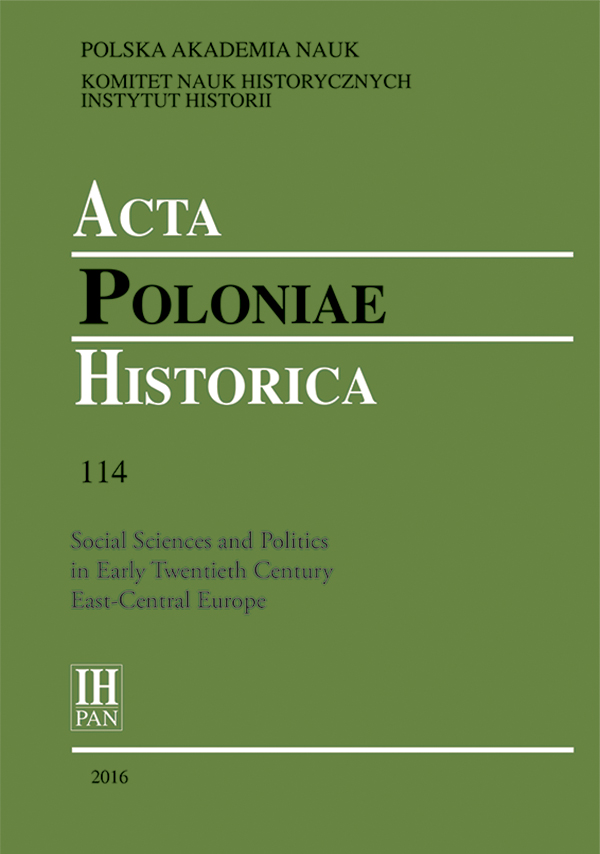Romanian Eugenic Sub-Culture and the Allure of Biopolitics, 1918–39
DOI :
https://doi.org/10.12775/APH.2016.114.02Mots-clés
sub-culture, eugenics, biopolitics, interwar Romania, Transylvania and the BanatRésumé
By the late 1920s a considerable body of eugenic literature in Romanian, Hungarian and German had been produced in Romania, illustrating the growing importance afforded to science and evolutionary theories of human improvement in this country. Engaging with this literature, this article investigates the emergence of a Romanian sub-culture in Transylvania and the Banat, sanctioned through eugenics and biopolitics, and promoted by cultural associations and prominent intellectuals and politicians. In so doing, this article contributes not only to a new appraisal of the relationship between ethnic minorities and majorities in interwar Romania, but also to a new understanding of the ways in which eugenics and biopolitics were harnessed to Romanian narratives of nation-building during the interwar period.Références
Bokor Zsuzsa, Testtörténetek. A nemzet és a nemi betegségek medikalizálása a két világháború közötti Kolozsváron (Kolozsvár, 2013).
Bucur Maria, Eugenics and Modernization in Interwar Romania (Pittsburgh, 2002). Georgescu Tudor, The Eugenic Fortress: The Transylvanian Saxon Experiment in Interwar Romania (Budapest, 2016).
Iancu Gheorghe, The Ruling Council: The Integration of Transylvania into Romania: 1918–1920, trans. by Magda Wachter (Cluj, 1995).
Livezeanu Irina, Cultural Politics in Greater Romania: Regionalism, Nation, Building & Ethnic Struggle, 1918–1930 (Ithaca, NY, 1995).
Matei Pamfil, Asociaţiunea Transilvană pentru Literatura Română şi Cultura Poporului Român (ASTRA) şi rolul ei în cultura naţională (1861–1950) (Cluj, 1986).
Moldovan Iuliu, Biopolitica (Cluj 1926).
Moldovan Iuliu, Igiena naţiunii: Eugenia (Cluj, 1925). Moldovan Iuliu, Statul ethnic (Sibiu, 1943).
Preda Gh., Activitatea ‘ASTREI’ în 25 ani de la Unire, 1918–1943 (Sibiu, 1944).
Turda Marius (ed.), The History of Eugenics in East-Central Europe, 1900–1945: Sources and Commentaries (London, 2015).
Turda Marius and Gillette Aaron, Latin Eugenics in Comparative Perspective (London, 2014).
Turda Marius, ‘Controlling the National Body: Ideas of Racial Purification in Romania, 1918–1944’, in Christian Promitzer, Sevasti Trubeta, and Marius Turda (eds.), Health, Hygiene and Eugenics in Southeastern Europe to 1945 (Budapest, 2011), 325–50.
Turda Marius, ‘Gheorghe Banu’s Theory of Rural Biology in the 1920s Romania’, in Constantin Barbulescu and Alin Ciupală (eds.), Medicine, Hygiene and Society from the Eighteenth to the Twentieth Centuries (Cluj-Napoca, 2012), 125–40.
Turda Marius, Modernism and Eugenics (Basingstoke, 2010).
Turda Marius ‘The Nation as Object: Race, Blood, and Biopolitics in Interwar Romania’, Slavic Review, lxvi (2007), 413–41.
Voina Aurel, Eugenia şi igiena naţiunii (Cluj, 1924).
Téléchargements
Publiée
Comment citer
Numéro
Rubrique
Licence
Title, logo and layout of journal are reserved trademarks of APH.Stats
Number of views and downloads: 537
Number of citations: 3



